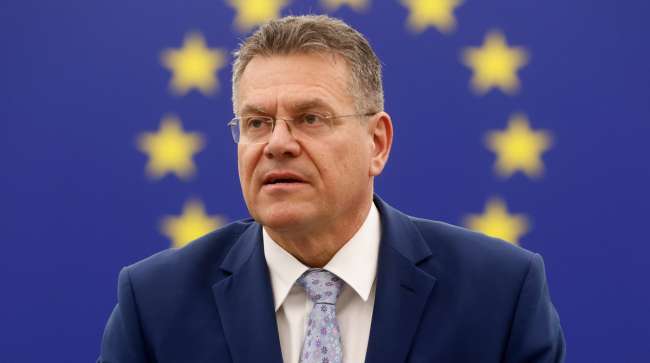“While the EU remains open and prefers negotiations, we will not wait endlessly,” EU Trade Commissioner Maros Sefcovic said. (Jean-Francois Badias/Associated Press)
European Union trade ministers closed ranks and signaled readiness to deploy a full spectrum of countermeasures including potential taxes on digital companies in response to President Donald Trump’s sweeping tariffs.
“While the EU remains open and prefers negotiations, we will not wait endlessly,” EU Trade Commissioner Maros Sefcovic said April 7 in Luxembourg.
Speaking after talks with his member state counterparts, he highlighted that “until now — despite efforts and openings — we haven’t seen the real engagement which would lead to the mutually acceptable solution, because it has to be fair for both sides,” adding that “we are not in the business of going tit-for-tat.”
Trump’s move to slap a 20% tariff on EU goods as part of his “America First” agenda has stirred fears of a global trade war — and led to a meltdown in financial markets. While the EU has expressed willingness to engage in talks, officials said the bloc won’t hesitate to respond if attempts at reconciliation were to falter.
Member states “want to give the U.S. time to think about the whole situation as the U.S. market lost 5 trillion within a few days, it’s not a good solution for the U.S. economy,” said Michal Baranowski, Poland’s Undersecretary for Economic Development and Technology, who chaired the meeting.
The 27 rallied behind supporting the commission’s approach to negotiate and prepare countermeasures if talks fail, giving the commission a solid mandate to move ahead with its plan, senior EU diplomats said. Only Hungary and Italy requested more time to impose the retaliatory tariffs against U.S. goods in response to the US 25% tariffs on steel and aluminum, one of the people said.
“We were some countries saying everything is possible, we have a wide toolbox and everything is possible,” French Trade Minister Laurent Saint-Martin told Bloomberg Television after the gathering concluded. “We don’t want to use it but we can use it, and this is what was most consensual.”

“We have a wide toolbox and everything is possible,” Saint-Martin said. (Christophe Ena/Associated Press)
Germany’s Economy Minister Robert Habeck, who also serves as vice chancellor, earlier emphasized the need to “take a closer look” at the EU’s anti-coercion instrument, the bloc’s most powerful retaliatory tool. That mechanism could pave the way for levies targeting digital giants, many of which are based in the U.S.
Speaking earlier in Brussels, European Commission President Ursula von der Leyen told reporters that the EU will set up an import surveillance task force to monitor the fallout from tariffs. She said its aim would be to “protect ourselves against indirect effects through trade diversion.”
She repeated the bloc’s standard line that it’s eager to pursue negotiations but ready to retaliate if necessary. And she said the EU will be looking to bolster its trade relations with other global partners.
“We will be focused like a laser beam on the 83% of global trade beyond the U.S.,” she added.
Von der Leyen noted that the EU has previously offered to zero out tariffs on industrial products, including autos, if the U.S. does the same, but that Washington hasn’t engaged.
White House trade adviser Peter Navarro said April 7 in an interview on CNBC that the EU’s offer to cut tariffs is “a good small start,” but a bigger problem is non-tariff “cheating,” citing the bloc’s value-added tax as one complaint.
“Let’s talk, let’s explore the possibility how we can push the tariffs down to zero as we had for several goods until April 2 and that would clearly be the boost for the car industry for both sides,” Sefcovic said in Luxembourg. “We are ready to discuss zero-zero for cars but we are also ready to discuss zero-zero for all industrial goods — what it means: beyond automotives we are talking about chemicals, pharmaceuticals, rubber and plastic, machinery and I would say the rest of industrial products.”
Sefcovic also showed openness to discuss non-tariff issues as the U.S. has demanded as long as there’s a mutual benefit for both sides. But he said that the VAT is an important source of income for member states and the EU would not change this system.






